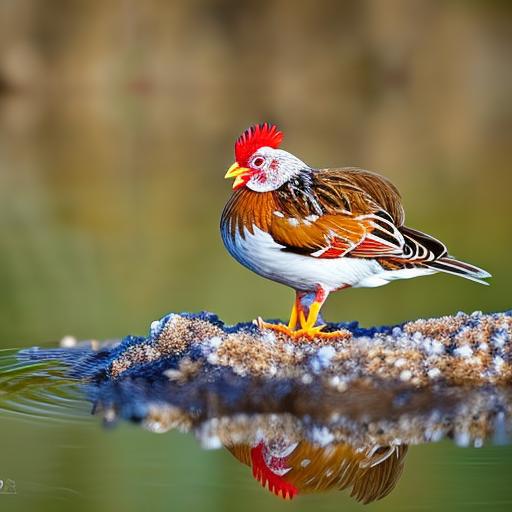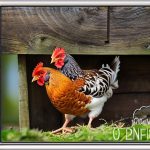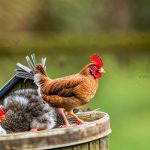Water is an essential component of a chicken’s diet and overall health. Just like humans, chickens need water to survive and stay hydrated. Lack of water can lead to dehydration, illness, and even death. In the winter months, it can be particularly challenging to keep water from freezing, which poses additional risks to the health and well-being of your flock.
Chickens require water for various bodily functions, including digestion, temperature regulation, and egg production. Water helps in the digestion process by breaking down food and aiding in nutrient absorption. It also helps regulate body temperature by allowing chickens to pant and cool down. Additionally, water is necessary for egg production as it helps form the eggshell and provides hydration to the developing embryo.
Key Takeaways
- Water is essential for chickens to stay healthy and hydrated, especially during the winter months.
- Frozen water can pose a serious risk to your flock, leading to dehydration and other health issues.
- Choosing the right waterer and insulating it properly can help prevent freezing and ensure your chickens have access to clean water.
- Adding warm water or using heated waterers are effective ways to keep your flock hydrated in cold weather.
- Alternative watering solutions, such as using heated buckets or nipple waterers, can also be effective in preventing freezing and ensuring your chickens have access to water.
Understanding the Risks of Frozen Water for Your Flock
Frozen water can pose significant risks to your flock’s health. When water freezes, it becomes inaccessible to chickens, leading to dehydration. Dehydration can cause a range of health issues, including decreased egg production, weight loss, reduced immune function, and even death in severe cases.
Moreover, frozen water can also cause damage to waterers. When water freezes inside a waterer, it expands and can crack or break the container. This not only leads to wasted water but also creates a potential hazard for your chickens if they come into contact with broken pieces of the waterer.
Choosing the Right Waterer for Cold Weather
Choosing the right waterer for cold weather is crucial in ensuring your flock has access to clean and unfrozen water. Look for waterers specifically designed for cold weather conditions. These waterers often have insulation or heating elements that prevent freezing.
Consider the size of your flock when choosing a waterer. If you have a large flock, you may need multiple waterers to ensure all chickens have access to water. On the other hand, if you have a small flock, a smaller waterer may be sufficient.
Additionally, choose a waterer that is easy to clean and maintain. Regular cleaning is essential to prevent bacteria growth and keep the water fresh and safe for your chickens to drink.
Insulating Your Waterer to Prevent Freezing
| Insulating Material | Effectiveness | Cost |
|---|---|---|
| Styrofoam | High | Low |
| Bubble Wrap | Medium | Low |
| Reflective Foil | High | Medium |
| Heated Waterer | Very High | High |
Insulating your waterer is an effective way to prevent freezing in cold weather. There are several insulation materials you can use, such as foam insulation or bubble wrap. Wrap the insulation material around the waterer, making sure to cover all sides and the top. This will help retain heat and prevent freezing.
You can also cover the waterer with blankets or tarps to provide additional insulation. However, make sure the materials you use are safe for chickens to be around. Avoid using materials that may contain harmful chemicals or toxins.
Adding Warm Water to Your Chickens’ Drinking Supply
Adding warm water to your chickens’ drinking supply can help prevent dehydration and keep the water from freezing. During cold weather, fill the waterer with warm water instead of cold water. The warmth of the water will help raise the overall temperature of the waterer, making it less likely to freeze.
However, be cautious not to make the water too hot for your chickens to drink. Chickens have sensitive beaks and can be burned by hot water. Test the temperature of the water with your hand before filling the waterer to ensure it is warm but not scalding.
Using Heated Waterers to Keep Your Flock Hydrated

Heated waterers are specifically designed to keep water from freezing in cold weather. These waterers have built-in heating elements that prevent ice formation and ensure a constant supply of unfrozen water for your flock.
Heated waterers are particularly beneficial for larger flocks as they can hold more water and provide hydration for a larger number of chickens. However, it is essential to follow the manufacturer’s instructions when using heated waterers to ensure safe and proper operation.
Alternative Watering Solutions for Your Chickens in Winter
If you are unable to find a suitable waterer for cold weather or if your waterer freezes despite insulation or heating, there are alternative watering solutions you can consider.
One option is to use a heated dog bowl or bucket as a waterer. These are readily available and often have built-in heating elements that prevent freezing. They can be a cost-effective alternative to specialized chicken waterers.
Another option is to use a nipple waterer. Nipple waterers have small valves that release water when chickens peck at them. This design makes them less likely to freeze compared to traditional open waterers. However, it is essential to ensure that the nipples are not frozen and that chickens can access the water easily.
Additionally, you can provide your chickens with fresh snow to eat as a source of hydration. Chickens can consume snow, which will melt in their bodies and provide them with water. However, this should not be the sole source of hydration, as it may not be sufficient for their needs.
Tips for Maintaining Clean Water for Your Flock
Maintaining clean water for your flock is crucial for their health and well-being. Here are some tips to help you keep the waterers clean:
1. Clean waterers regularly: Regularly clean the waterers to prevent bacteria growth and ensure fresh and safe drinking water for your chickens. Empty the waterer, scrub it with a brush, and rinse thoroughly before refilling.
2. Use a water treatment solution: Consider using a water treatment solution designed specifically for poultry. These solutions help prevent bacteria growth and keep the water clean and safe for your flock.
3. Provide enough waterers: Ensure that there are enough waterers available for your flock to prevent overcrowding and competition for access to water. Overcrowding can lead to stress and increased risk of disease transmission.
Strategies for Preventing Ice Buildup in Your Waterer
Ice buildup in waterers can be a common problem during the winter months. Here are some strategies to prevent ice buildup:
1. Use a waterer with a built-in heater or insulation: Invest in a waterer that has a built-in heater or insulation to prevent ice formation. These specialized waterers are designed to keep the water at a temperature that prevents freezing.
2. Add a small amount of vinegar to the water: Adding a small amount of vinegar to the water can help prevent ice buildup. The acidity of the vinegar lowers the freezing point of the water, making it less likely to freeze.
3. Use a waterer with a lid: A waterer with a lid can help prevent ice from forming on the surface. The lid acts as a barrier, preventing cold air from coming into direct contact with the water and reducing the chances of freezing.
Ensuring Your Chickens Stay Hydrated in the Winter Months
Keeping your chickens hydrated in the winter months is essential for their health and well-being. Water is vital for various bodily functions and helps regulate body temperature, aid digestion, and support egg production.
Choose the right waterer for your flock, considering factors such as size and ease of cleaning. Insulate your waterer to prevent freezing, and consider alternative watering solutions if necessary. Regularly clean the waterers and provide strategies to prevent ice buildup.
By taking these steps, you can ensure that your chickens have access to clean and unfrozen water throughout the winter, promoting their overall health and well-being.
If you’re looking for ways to keep your chickens’ water from freezing during the winter months, you might find this article on the Producers Pride Sentinel Chicken Coop helpful. It provides tips and recommendations on how to prevent water freezing in your chicken coop. Check it out here.
FAQs
What causes chicken water to freeze?
During winter, the temperature drops below freezing point, causing the water in the chicken’s waterer to freeze.
Why is it important to keep chicken water from freezing?
Chickens need access to clean water at all times to stay hydrated and healthy. If their water freezes, they may become dehydrated, which can lead to health problems.
What are some ways to keep chicken water from freezing?
Some ways to keep chicken water from freezing include using heated waterers, adding insulation to the waterer, using a heated base, and using a water heater.
What is a heated waterer?
A heated waterer is a waterer that has a built-in heating element that keeps the water from freezing. It is designed to be used during winter months.
What is a heated base?
A heated base is a device that is placed under the waterer to keep the water from freezing. It is designed to be used with non-heated waterers.
What is a water heater?
A water heater is a device that is installed in the water line to keep the water from freezing. It is designed to be used with larger flocks of chickens.
Meet Walter, the feathered-friend fanatic of Florida! Nestled in the sunshine state, Walter struts through life with his feathered companions, clucking his way to happiness. With a coop that’s fancier than a five-star hotel, he’s the Don Juan of the chicken world. When he’s not teaching his hens to do the cha-cha, you’ll find him in a heated debate with his prized rooster, Sir Clucks-a-Lot. Walter’s poultry passion is no yolk; he’s the sunny-side-up guy you never knew you needed in your flock of friends!







